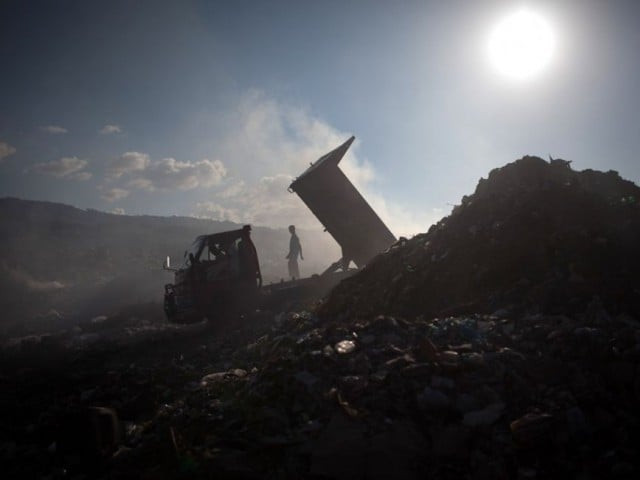Solid matter: A better way to manage your waste
Sindh Solid Waste Management Programme aims to make Karachi cleaner, greener

Highlighting the salient features of the Sindh Solid Waste Management Programme, he said that Karachi produced around 11,000 tons of garbage daily while the private sector earned Rs250 million by recycling the waste. PHOTO: AFP
“The huge piles of garbage burning in almost every street are making the whole society sick,” he said. Sheikh was speaking at a discussion with representatives of various NGOs at the Urban Resource Centre on Wednesday.
Citing a report of the Asian Development Bank, he said that poisonous fumes emanating from the burning debris were causing serious health problems for the citizens. Children were the most vulnerable as a large number were now suffering from asthmatic symptoms. “I saw garbage burning in five different places on the way from Clifton Block 2 to the URC office today,” he exclaimed. “This is in spite of the government’s claims of having stated a cleanliness campaign in the city.”
According to Shiekh, only around 30 per cent of the solid waste is currently being transferred to landfill sites, while another 40 per cent is being dumped in storm nullahs, the Malir River and into the sea. The remaining is collected at random sites and burnt. “Would you believe the government is spending Rs3.5 billion on solid waste management in the city each year?” he questioned.
For Sheikh, it is time to revolutionise the system of garbage collection and disposal by incorporating the latest technological methods. Highlighting the salient features of the Sindh Solid Waste Management Programme, he said that Karachi produced around 11,000 tons of garbage daily while the private sector earned Rs250 million by recycling the waste. “Waste recycling generates so much revenue in spite of the fact that only around 27 per cent of the waste is recycled in Karachi,” he reasoned. “It is worth noting how much the sector has to offer when it attracts investors from the private sector.” He added that apart from recycling, the waste could also be used to generate energy by various methods such as plasma gasification, anaerobic digestion and composting for bio-processing.
The programme will also make the functioning of the Karachi Metropolitan Corporation (KMC) more efficient as the municipality will be able to rid itself of almost 70 per cent of the ghost employees. “We will also increase the salaries of KMC employees,” he said.
Sheikh revealed that the Sindh government plans to outsource the various functions of waste management such as collection, transport, treatment and disposal in Karachi to private operators after inviting bids from international firms. “This will not only make the programme cost-effective but the private firms will be able to fill the existing gap in capacity and infrastructure.”
URC director Zahid Farooq lauded the programme, hoping that its implementation will provide much-needed relief for the citizens of Karachi.



















COMMENTS
Comments are moderated and generally will be posted if they are on-topic and not abusive.
For more information, please see our Comments FAQ